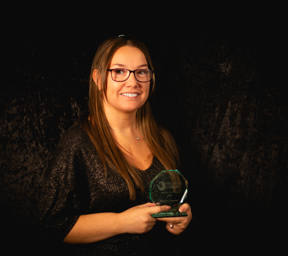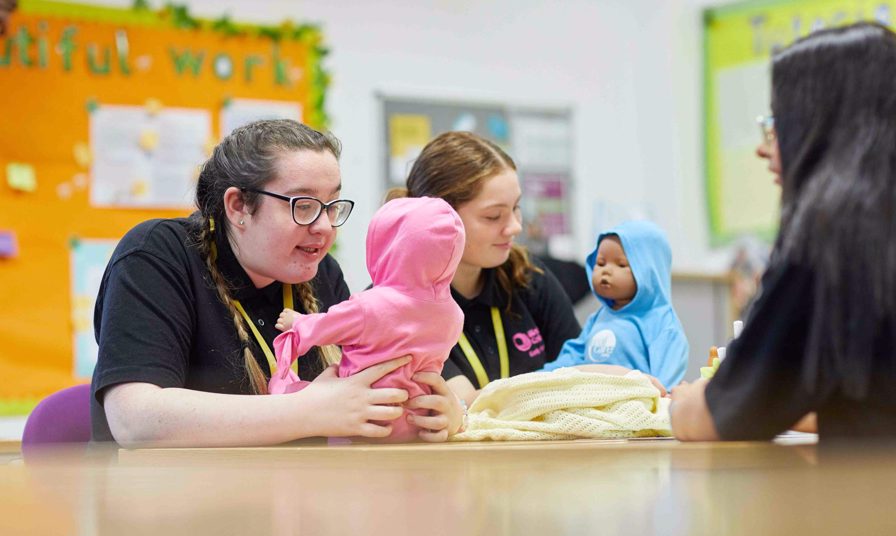Entry Requirements
Level 3 Early Years Qualification
DBS Certificate
Level 2 English and Maths prior to EPA
Study Mode
Part time
Duration
1 year
Timetable
Check with tutor
Key features and Benefits
- Study at our state-of-the-art campus, The Blackburn Learning Quarter
- Study at one of the Top 3 Colleges in England*
- Benefit from our strong industry connections
This occupation is found in a range of settings which can include day nurseries, playgroups, nursery schools, pre-schools, kindergartens, primary schools, hospitals, social care settings, out of school environments and local authority provision. The broad purpose of the occupation is to be a proactive and influential practitioner, working directly with children, skilfully leading day to day practice at an operational level.
-
Overview
An active practitioner will be an effective role model of play-based learning, supporting others to develop their own practice. The practitioner is a highly skilled professional who will take an operational lead for the care, learning and development of all young children within their care, adapting to individual needs providing inclusive and holistic provision. The practitioner will engage with sector developments both locally and nationally, with a commitment to developing their own professional and educational competencies.
In daily work, an employee in this occupation interacts with children aged birth to eight years, families, practitioners, other professionals and appropriate agencies. A practitioner in this occupation will be responsible for supporting the quality of learning and development in their setting. The practitioner will lead on the operational aspects of the provision and are typically responsible for leading other practitioners and / or an aspect or environment such as; Communication and Language, Planning and Assessment, Forest School, Physical Activity and Nutrition. The practitioner usually reports directly to the head of the setting (The Manager, The Leader, The Director).
-
What will I study?
-
Duty 1: Promote the health and well-being of all children, self-regulation and resilience through learning rich environments, opportunities for challenging play and a healthy attitude towards risk taking.
Duty 2: Provide playful, sensitive interaction opportunities that reflect children's needs, interests and motivations in order to facilitate and extend deep level learning.
Duty 3: Participate in and lead daily routines and practice, including children’s’ personal care, play and maintaining the physical environment.
Duty 4: To be an effective key person and advocate for the child, supporting the child’s developmental, emotional and daily needs within a secure and caring relationship. To ensure the effectiveness of the key person approach across the aspect or environment for which they are responsible.
Duty 5: To take the lead and provide support in disseminating best practice in the use of observation, assessments and planning to meet children's needs and extend their holistic development within the aspect or environment for which they are responsible.
Duty 6: Promote, demonstrate and facilitate a clear understanding of diversity and equality to support all children, including those with additional needs, those of high ability, those with English as an additional language and those with disabilities. To be able to use and evaluate distinctive approaches which engage and support inclusivity of all children within their social and cultural context.
Duty 7: Ensure full compliance with all safeguarding legislation, policies and strategies at a national, local and setting based level are promoted, implemented and embedded respectfully within practice, providing appropriate support to colleagues as, or supporting, the Designated Safeguarding Lead.
Duty 8: Demonstrate leaderful practice through the effective deployment of resources and practitioners keeping the child’s voice and needs central to practice.
Duty 9: Reflect and build on practice through ongoing professional enquiry and action research to contribute to the pedagogical approach of their setting. To be accountable for day to day practice, longer term planning, management and training within the specific aspect or environment for which they are responsible.
Duty 10: Establish engaging, inclusive and collaborative relationships and participate in multiagency meetings. Enable and facilitate practitioners to develop professional relationships with parents, carers and multi-agencies to meet the individual needs of the children.
Duty 11: Commit to becoming a reflective practitioner, enhancing skills and knowledge to improve pedagogical practice. Guide and support the development of the reflective practice of others.
Duty 12: Initiate continuing professional development opportunities in response to identification of strengths and weaknesses both personally and within your team. Provide constructive feedback on points of practice on an informal day to day basis and contribute to formal performance management as necessary.
Duty 13: Ensure compliance with all Health and Safety legislation, policies and strategies at a national, local and setting based level.
Duty 14: Maintain effective administrative systems including development records, assessment, report writing and record keeping, such as risk assessments and safeguarding concerns.
Duty 15: Work in collaborative partnership with parents and carers in the planning, implementation and review of strategies in place to support children's experience, holistic development, learning and progress.
Duty 16: To lead and manage across the area, aspect or environment for which they are responsible for.
-
-
Entry Requirements
- Undertake the Disclosure and Barring Service process and provide the result
- Have completed a Level 3 Early Years Qualification
- Apprentices without level 2 English and Maths will need to achieve this level prior to taking the End-Point Assessment.
-
How will I be assessed?
-
Through an End Point Assessment (EPA).
-
-
Your Study Programme
-
Discover other courses in Early Years

We're proud to be Lancashire's Apprenticeship Provider of the Year.
Lancashire Apprenticeship Awards 2024














